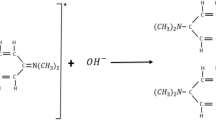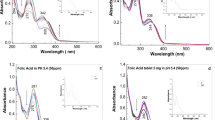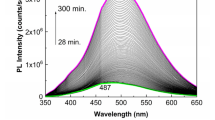Abstract
RESULTS of our potentiometric measurements of the photovoltaic effect in the ultra-violet region on platinum and mercury electrodes in aqueous solutions of sulphuric acid, potassium hydroxide and potassium sulphate led us to the conclusion that the observed potential changes of the illuminated electrode are caused by a competitive action of oxidizing and reducing species formed in water under the incident light.
This is a preview of subscription content, access via your institution
Access options
Subscribe to this journal
Receive 51 print issues and online access
$199.00 per year
only $3.90 per issue
Buy this article
- Purchase on Springer Link
- Instant access to full article PDF
Prices may be subject to local taxes which are calculated during checkout
Similar content being viewed by others
References
Swensson, T., Arkiv Kemi, Min. och Geologi, 7, No. 19, 1 (1919).
Lifschitz, J., and Hooghoudt, S. B., Z. phys. Chem., A, 141, 52 (1929).
Audubert, R., J. Chim. Phys., 27, 169 (1930).
Bowden, F. P., Trans. Farad. Soc., 27, 505 (1931).
Price, L. E., Dissertation, Cambridge Univ. (1938).
Hillson, P. J., and Rideal, E. K., Proc. Roy. Soc., A, 199, 295 (1949).
Author information
Authors and Affiliations
Rights and permissions
About this article
Cite this article
HEYROVSKÝ, M., NORRISH, R. Photovoltaic Phenomena in Aqueous Solutions. Nature 200, 880–881 (1963). https://doi.org/10.1038/200880a0
Issue Date:
DOI: https://doi.org/10.1038/200880a0
This article is cited by
-
Nature of the Photoeffect in Aqueous Solutions
Nature (1965)
Comments
By submitting a comment you agree to abide by our Terms and Community Guidelines. If you find something abusive or that does not comply with our terms or guidelines please flag it as inappropriate.



